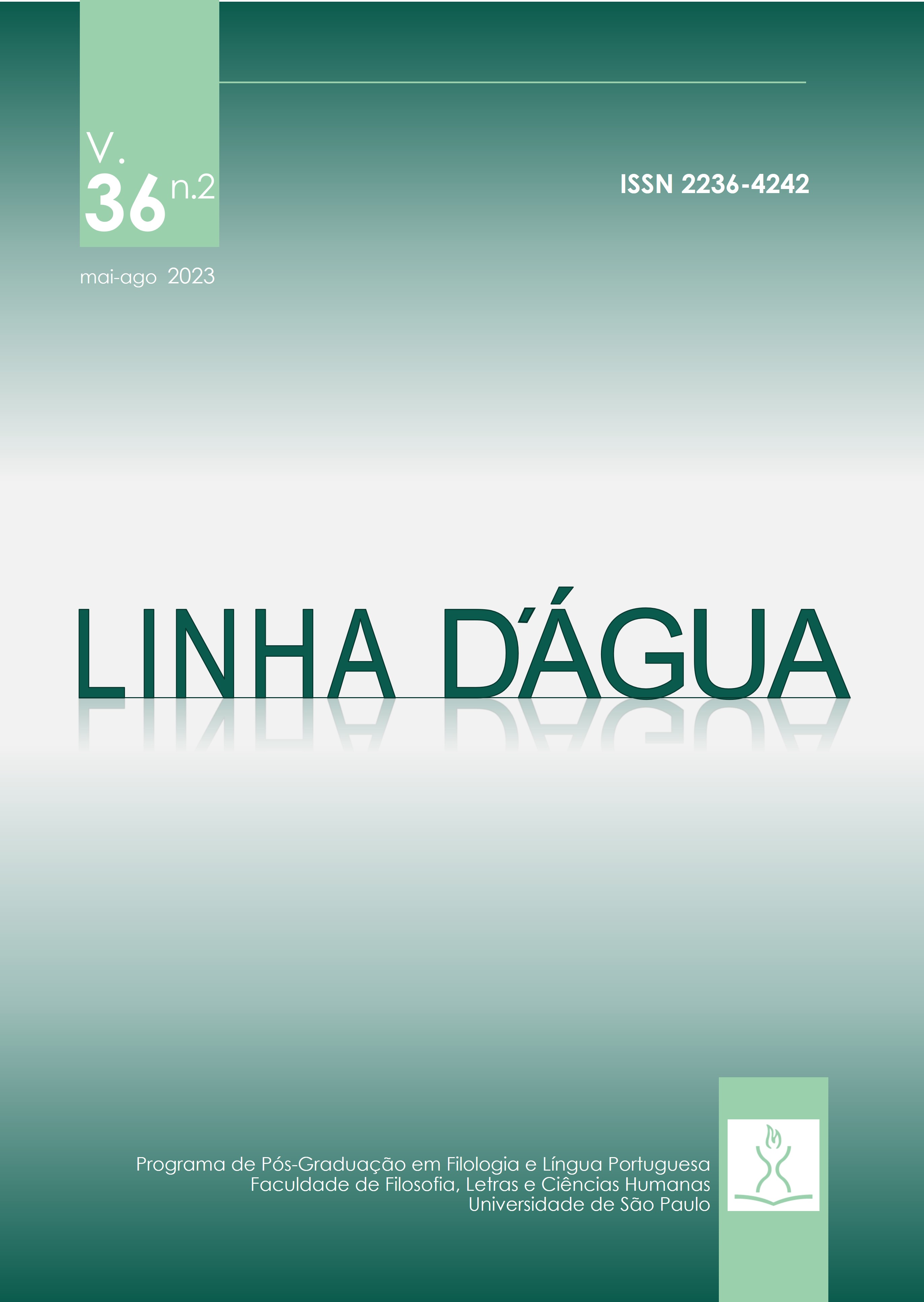What Portuguese as a Foreign Language tells us about forms of address: an analysis of discourses of legitimation
DOI :
https://doi.org/10.11606/issn.2236-4242.v36i2p138-164Mots-clés :
Addressive behaviour, Pragmatics, Fluidity, Standard PortugueseRésumé
This study examines how didactic materials of Portuguese as a Foreign Language (textbooks, grammars) describe forms of address in European Portuguese and the discourses they postulate to legitimise verbal addressive behaviour, in particular when it comes to the pronoun você. The main findings are: textbooks and grammars legitimise the usage of você whilst excluding vós, despite the fact that some acknowledge the ambiguous status of você as neither a T nor a V form; the complexity and instability of the system of forms of address means that they are present in textbooks primarily apropos of other linguistic content (grammatical items such as verb conjugations, speech acts such as requests, introductions, greeting), usually precluding the field of Portuguese as a Foreign Language from postulating clear, transparent explanations guiding foreign learners in how to address others.
Téléchargements
Références
AHMED, F.; NARCY-COMBES, M. An Analysis of Textbooks from a Cultural Point of View. Tesol Journal, v. 5, p. 21-37, 2011.
BANZA, A. P. Uma língua; muitas vozes: para uma política linguística pluricêntrica do português. In: HABLER, G.; SCHÄFER-PRIEB, B. (ed.). Contatos linguísticos na sequência da expansão portuguesa. Berlin: Peter Lang, 2021. p. 15-32.
BERMEJO, V. L. Imperativos y cortesía en las lenguas romances de la Península Ibérica. Bulletin of Hispanic Studies, v. 95, p. 1-23, 2018.
BERNSTEIN, B. The structuring of pedagogic discourse. London: Routledge, 1990.
BRAUN, F. Terms of Address. Problems of Patterns and Usage in Various Languages and Cultures. Berlin: Mouton de Gruyter, 1988.
BROWN, A.; GILMAN, R. The Pronouns of Power and Solidarity. In: SEBEOK, T. A. (ed.). Style in Language. [s.l.]: MIT Press, 1960.
CARREIRA, M. H. Modalisation linguistique en situation d’interlocution: proxémique verbale et modalités en portugais. Louvain-Paris: Peeters, 1997.
CARREIRA, M. H. Semântica e discurso, estudos de Linguística Portuguesa e Comparativa (Português/Francês). Porto: Porto Editora, 2001.
Carreira, M. H. Les formes allocutives du portugais européen: évolutions, valeurs et fonctionnements discursifs. In: Coloquio Pronombres de Segunda Persona y Formas de Tratamiento en las Lenguas de Europa. Plenary talk. Paris: Instituto Cervantes de Paris, 2003. Available at: https://cvc.cervantes.es/lengua/coloquio_paris/ponencias/pdf/cvc_araujo.pdf. Accessed on: 18 November 2022.
CARREIRA, M. H. Politeness in Portugal; how to address others. In: HICKEY, L.; STEWART, M. (ed.). Politeness in Europe. Clevedon/ Buffalo: Multilingual Matters, 2005. p. 306 – 315.
CASTRO, Ivo. O linguista e a fixação da norma. Actas do XVIII Encontro Nacional da Associação Portuguesa de Linguística, Lisboa: APL, p. 1-18, 2003.
CINTRA, L. F. L. Sobre Formas de Tratamento na Língua Portuguesa. Lisboa: Livros Horizonte, 1972.
COOK, M. Uma Teoria de Interpretação das Formas de Tratamento na Língua Portuguesa. Hispania, v. 80, n. 3, p. 451-464, 1997.
COOK, M. Portuguese Pronouns and other Forms of Address, from the Past into the Future – Structural, Semantic and Pragmatic Reflections. Ellipsis, v. 11, p. 267-290, 2013.
COOK, M. N-V-T, a framework for the analysis of social dynamics in address pronouns. In: Bouissac, P. (ed.). The Social Dynamics of Pronominal Systems: a comparative approach. Amsterdam; Philadelphia: John Benjamins Publishing Company, 2019. p. 17-34.
CUNHA, C.; CINTRA, L. F. L. Gramática do Português Contemporâneo. Lisboa: Edições João Sá da Costa, 1984.
DUARTE, I. M. Formas de tratamento: item gramatical no ensino de Português Língua Materna. In: BRITO, A. M. (ed.). Gramática: História, Teoria, Aplicações. Porto: Fundação da Universidade do Porto, 2010. p. 133–147.
DUARTE, I. M. Formas De Tratamento Em Português: Entre Léxico e Discurso. Matraga, v. 18, n. 28, p. 84-101, 2011.
DENDRINOS, B. Prática Ideológica em textos pedagógicos no ensino do Inglês como Língua Estrangeira. In: PEDRO, M. E. (ed.). Análise Crítica do Discurso. Lisboa: Editorial Caminho, 1997. p. 225-260.
FARACO, C. A. O tratamento você em português: uma abordagem histórica. LaborHistórico, v. 3, n. 2, p. 114-132, 2017/1996.
GHARBAVI, A. A Content Analysis of Textbooks: Investigating Gender Bias as a Social Prominence in Iranian High School English Textbooks. English Linguistics Research, v. 1, n. 1, p. 42-49, 2012.
Gonçalves, L. Formas de Tratamento na Língua Portuguesa e na Língua Chinesa. In: GROSSO, M. J.; CLETO, A. P. (ed.). O Português na China: Ensino e Investigação. Lisboa: Lidel, 2014. p. 218 – 226.
GOUVEIA, C. As dimensões da mudança no uso das formas de tratamento em Português Europeu. In: DUARTE, I.M.; OLIVEIRA, F. (ed.). O fascínio da linguagem. Porto: Faculdade de Letras da Universidade do Porto, 2008. p. 91-100.
GOUVEIA, Carlos. “Tu como marca interpessoal de superioridade e de distância em Português Europeu” in Symposium “Próximos ou distantes? Formas de tratamento nas diferentes variedades do português”. VI SIMELP-Simpósio Muncial de Estudos de Língua Portuguesa, Plenary Talk. Santarém: Escola Superior de Educação do Instituto Politécnico de Santarém, 2017. (Personal correspondence with the author).
GUILHERME, A.R.B.; BERMEJO, V. L. Quão cortês é você? O pronome de tratamento você em Português Europeu. LaborHistórico, v. 1, n. 2, pp. 167-180, 2015.
GRAVES, K. Designing language courses: a guide for teachers. London: Heinle & Heinle, 2000.
HAMMERMÜLLER, G. Retracing the historical evolution of the Portuguese address pronoun você using synchronic variationist data. In: HUMMEL, M.; LOPES, C. S. (ed.). Address in Portuguese and Spanish. Berlin/ Boston: De Gruyter, 2020. p. 251-289.
HUMMEL, M. The diachronic expansion of Pt. vossa mercê > você and Sp. vuestra merced > usted. Working Papers em Linguística, v. 20, n. 2, p. 24-59, 2019.
HUMMEL, M. Diachronic research on address in Portuguese and Spanish. In: Hummel, M.; Lopes, C. S. (ed.). Address in Portuguese and Spanish. Berlin/ Boston: De Gruyter, 2020.p. 7-70.
HUTCHINSON, T.; Torres, E. The textbook as agent of change. ELT Journal, vol. 48, n. 4, p. 315-328, 1994.
KHODADADY, E.; SHAYESTEH, S. Cultural and linguistic imperialism and the EIL movement: evidence from a textbook analysis. Issues in Educational Research, v. 26, n. 4, p. 604-620, p. 2016.
LARA, V.; GUILHERME, A. The politeness of você in European Portuguese. Studies in Hispanic and Lusophone Linguistics, v. 11, n. 2, p. 337-336, 2018.
LITTLEJOHN, A. The analysis of language teaching materials: Inside the Trojan horse. In: TOMLINSON, B. (ed.). Materials development in language teaching. Cambridge: Cambridge University Press, 1998. p. 190-126.
LOPES, C. R. A formação dos sistemas de tratamento em português: mudança e avaliação. LaborHistórico, v. 5, p. 257-294, 2019.
LOPES, C. R.; MARTINS, A. L. N.; SOUZA, J. P. F. A origem da acepção negativa de você no português europeu: os contextos de uso de Vossa Mercê em cartas oitocentistas. LaborHistórico, v. 7, p. 93-126, 2021.
LOPES, C. R.; MOTA, M. A. A percepção e a aceitabilidade de formas de tratamento no português europeu (PE): uma abordagem experimental. Working Papers em Linguística, v. 20, n. 2, p. 135-174, 2019.
MANOLE, V. O legado da perda: o pronome vós no português europeu atual. Romania Contexta II, v. 2, p. 119-132, 2021.
MARQUES, M. A.; DUARTE, I. M. Formas de tratamento e preservação da face em interações verbais online. Revista da Associação Portuguesa de Linguística, v. 5, p. 236-249, 2019.
MARTINS, A. M. Introdução: O português numa perspetiva diacrónica e comparativa. In: Martins, A. M.; Carrilho, E. (ed). Manual de linguística portuguesa. Berlin/Boston: De Gruyter, 2016, p. 1-39.
MCGRATH, I. Materials evaluation and design for language teaching. Edinburgh: Edinburgh University Press, 2016.
NORRBY, C; WARREN, J. Address Practices and Social Relationships in European. Languages. Language and Linguistics Compass v. 6, n. 4, p. 225–235, 2012.
NUNAN, D. Language teaching methodology: a textbook for teachers. New York: London: Prentice Hall, 1991.
ODBER DE BAUBETA, P. A. Modes of address: translation strategies or the black hole. Ilha do Desterro, v. 28, p. 87-107, 1992.
OLIVEIRA, S. M. Winning friends and influencing people abroad: Using native speakers' communicative strategies. Intercultural Communication Studies, v. 4, n. 1, p. 23-44, 1994.
OLIVEIRA, S. M. Negotiating Identity, Conflict, and Cooperation within a Strategic Model of Address. In: DENIS, A.; KALEKIN-FISHMAN, D. (ed.). The ISA handbook in contemporary sociology: conflict, competition, cooperation. London: Sage, 2009. p. 416-432.
OLIVEIRA, S. M. Address in computer-mediated communication. In: HERRING, S. C.; STEIN, D.; VIRTANEN, T. (ed). Pragmatics of computer-mediated communication. Handbooks of Pragmatics, v. 9. Bonn: Walter de Gruyter, 2013. p. 291-314.
SILVA, Z. B.; WIŚNIEWSKA, J. Formas de tratamento nos manuais de Português Língua Estrangeira: uma abordagem na perspetiva da metalinguagem semântica natural. Romanica Cracoviensia, v. 4, p. 87–99, 2021.
SOARES DA SILVA, A. The pluricentricity of Portuguese: a sociolectometrical approach to divergence between European and Brazilian Portuguese. In: SOARES DA SILVA, A. (ed). Pluricentricity: language variation and sociocognitive dimensions. Berlin: De Gruyter Mouton, 2014, p. 143-188.
SOARES DA SILVA, A. O português no mundo e a sua estandardização: entre a realidade de uma língua pluricêntrica e o desejo de uma língua internacional. Braga: Centro de Estudos Humanísticos da Universidade do Minho; Editora Húmus, 2018.
SOARES DA SILVA, A. Normative Grammars. In: LEBSANFT, F. & TACKE, F. (ed). Manual of Standardization in the Romance Languages. Berlin; Boston: De Gruyter, 2020, p. 679 – 700.
SOARES DA SILVA, A.; TORRES, A.; GONÇALVES, M. (eds.). Línguas Pluricêntricas, Variação Linguística e Dimensões Sociocognitivas. Braga: Universidade Católica Portuguesa, 2011.
THOMAS, J. Cross-Cultural Pragmatic Failure. Applied Linguistics v. 4, n. 2, p. 91 – 111, 1983.
VAN LEEUWEN, T. Discourse and practice: new tools for critical discourse analysis. Oxford: Oxford University Press, 2008.
WATTS, R. J. Politeness. Cambridge: Cambridge University Press, 2003.
Téléchargements
Publiée
Numéro
Rubrique
Licence
(c) Copyright Rita Faria 2023

Ce travail est disponible sous licence Creative Commons Attribution - Pas d’Utilisation Commerciale 4.0 International.
A aprovação dos manuscritos implica cessão imediata e sem ônus dos direitos de publicação para a Linha D'Água. Os direitos autorais dos artigos publicados pertencem à instituição a qual a revista encontra-se vinculada. Em relação à disponibilidade dos conteúdos, a Linha D'Água adota a Licença Creative Commons, CC BY-NC Atribuição não comercial. Com essa licença é permitido acessar, baixar (download), copiar, imprimir, compartilhar, reutilizar e distribuir os artigos, desde que para uso não comercial e com a citação da fonte, conferindo os devidos créditos autorais à revista.
Nesses casos, em conformidade com a política de acesso livre e universal aos conteúdos, nenhuma permissão é necessária por parte dos autores ou do Editor. Em quaisquer outras situações a reprodução total ou parcial dos artigos da Linha D'Água em outras publicações, por quaisquer meios, para quaisquer outros fins que sejam natureza comercial, está condicionada à autorização por escrito do Editor.
Reproduções parciais de artigos (resumo, abstract, resumen, partes do texto que excedam 500 palavras, tabelas, figuras e outras ilustrações) requerem permissão por escrito dos detentores dos direitos autorais.
Reprodução parcial de outras publicações
Citações com mais de 500 palavras, reprodução de uma ou mais figuras, tabelas ou outras ilustrações devem ter permissão escrita do detentor dos direitos autorais do trabalho original para a reprodução especificada na revista Linha D'Água. A permissão deve ser endereçada ao autor do manuscrito submetido. Os direitos obtidos secundariamente não serão repassados em nenhuma circunstância.











